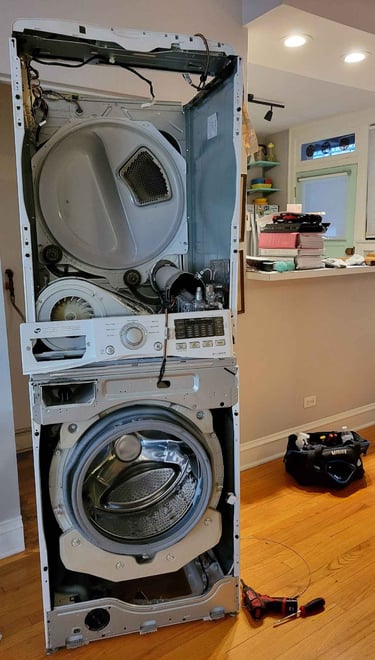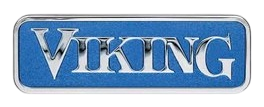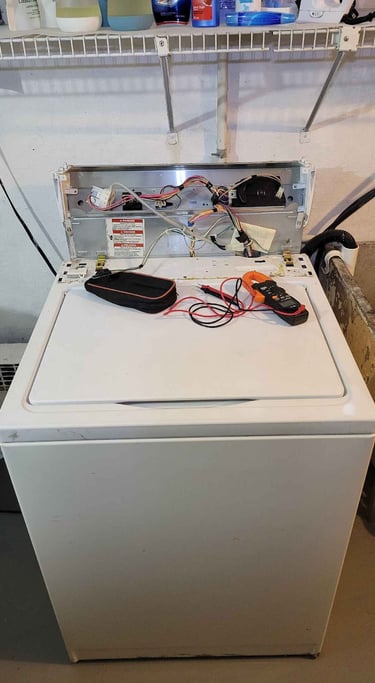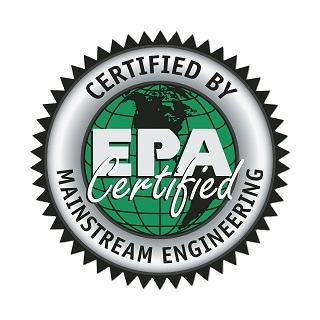
We Help Households Restore Laundry Convenience with Fast & Affordable, Expert Washing Machine Repair
across Long Beach, Anaheim, Los Angeles, and Beyond!
Stops mid-cycle
Error codes
Not spinning
Locked door
Not draining
Water not filling
At Aspeco Appliance Repair, we understand how important your washing machine is to keeping your home running smoothly with the service call fee waived when you decide to proceed with any repair. If you’re having issues, we’re here to help! Here’s what you can expect when you schedule a repair with us.
Expert Laundry Repair Solutions


1. Reach Out to Us
How to get started: Simply give us a call or fill out our easy online form. Let us know a bit about the problem you’re experiencing with your washing machine.
Service Call Fee? Not a worry! We’ll waive the service call fee as long as you go ahead with the repair. That’s our way of saying thank you for choosing us!
2. Schedule a Convenient Appointment
Choose a time that works best for you! We know your time is valuable, so we offer flexible scheduling options to fit your busy day.
Our friendly team will confirm the appointment and provide you with an estimated window for when our technician will arrive.
3. Our Technician Arrives Ready to Help
On the day of your appointment, our expert technician will arrive at the scheduled time, equipped with the tools and parts needed to assess your washing machine.
Expect a thorough inspection and an explanation of the issue. Our technician will explain what went wrong, and provide you with a clear repair solution.
4. Upfront Repair Estimate
Once we’ve diagnosed the problem, we’ll give you an upfront, transparent repair estimate before starting any work.
No hidden fees, no surprises! You’ll know exactly what to expect.
5. Fast & Professional Repair
If you approve the repair, our technician will get to work right away. We’ll do our best to get your washing machine up and running as quickly as possible.
With our skilled technicians, you can trust that the job will be done right the first time.
6. Enjoy Your Working Washing Machine
Once the repair is complete, your washing machine will be good to go! We’ll take the time to test it and make sure everything is running smoothly before we leave.
You’ll have peace of mind knowing your washing machine is in top shape.
7. Final Review & Payment
After the repair, we’ll go over everything one last time to ensure you’re completely satisfied with the service.
You’ll only pay for the repair, the service call fee is on us!
8. Ongoing Support
Need help in the future? We're here for you! Our friendly customer service team is always available to answer any questions and assist with any concerns.
Why Choose Us?
Expert Technicians: Our team is highly trained to repair all major washing machine brands.
No Service Call Fee: We waive the service call fee with any repair, so you’re saving right from the start!
Convenient Scheduling: We’ll work around your schedule to make the process as easy as possible.

What motivates our customers to choose us for home appliance repair?
Affordable prices
Licensed Certified Insured
Guaranteed satisfaction
Warranty
We firmly believe that customer satisfaction is the cornerstone of our success.
Upfront, and transparent pricing. No hidden fees. Free service call with any repair!
When you choose us, you're choosing quality, professionalism, and reliability!
On parts and labor, providing you with confidence that your appliance is repaired correctly.
We breathe new life into appliances from all major brands!
If you can't find your brand, just give us a call! Chances are we have worked on that brand many times before.






Detect & Troubleshoot Common Washer Problems
Your top load washing machine makes laundry day easier, but sometimes it can run into issues. Many problems are simple to detect. Here’s a guide to some of the most common top load washing machine problems, how to spot them, and what you can do.
1. Washing Machine Won’t Start
Symptoms: The machine doesn’t turn on when you press the start button. There may be no sounds or movement.
How to Detect: Check if the power cord is properly plugged. Make sure the door is fully closed and latched.
Troubleshooting Tips:
Ensure the power supply is stable and check the circuit breaker.
If it’s plugged in but still won’t start, the issue could be a faulty lid switch or a broken control board. These typically require professional repair.
2. Washer Won’t Fill with Water
Symptoms: The washer does not fill with water, or fills very slowly, even though it's turned on.
How to Detect: Check the water hoses to see if they’re kinked or blocked. Inspect the water inlet valve and filters.
Troubleshooting Tips:
Make sure the water supply valves are turned on fully.
Clean any clogged filters in the hose or valve.
If the water still doesn’t flow properly, the inlet valve might be faulty and will need replacement.
3. Excessive Vibrations or Noise
Symptoms: The washing machine shakes, bangs, or makes loud noises during the spin cycle.
How to Detect: Pay attention to how the machine is positioned. Is it level? Check for any loose items inside the drum.
Troubleshooting Tips:
Ensure your washer is on a flat, stable surface. Adjust the legs to level the machine.
Check for any items like coins or buttons stuck in the drum that could cause noise.
4. Water Leaks Around the Washer
Symptoms: Water is leaking from the washer, either around the door or from underneath.
How to Detect: Look for leaks during the washing or draining cycle. Check the hoses for cracks or loose connections.
Troubleshooting Tips:
Tighten any loose hose connections and check for leaks.
Inspect the door seal for any cracks or debris that might be causing the leak. Clean the door seal if necessary.
If leaking continues from the bottom, there may be an issue with the pump or a hose, which may need to be replaced.


5. Washer Won’t Drain or Spin
Symptoms: After a wash cycle, the machine doesn’t drain water or spin out the clothes.
How to Detect: If the tub is full of water and clothes are wet after the cycle, check the drainage system.
Troubleshooting Tips:
Check the drain hose for blockages or kinks.
Inspect the pump filter for debris or clogs.
If the pump is clear and the washer still won’t drain, the drain pump or belt may be faulty and might need replacement.
6. Washer Stops Mid Cycle
Symptoms: The washing machine suddenly stops during a cycle and won’t continue.
How to Detect: Note when the cycle halts, whether it’s during washing, rinsing, or spinning. A paused cycle could indicate a faulty timer or control board.
Troubleshooting Tips:
Check if the lid switch is working properly. If not, the machine may stop mid-cycle as a safety feature.
Unplug the machine for a few minutes and reset the cycle to see if it resumes.
If the problem continues, you may need to replace the timer, control board, or lid switch.
7. Foul Odors or Moldy Smell
Symptoms: A musty or sour smell coming from the washer, even after clothes are clean.
How to Detect: If clothes come out smelling bad, or there’s a lingering odor in the washer, it’s a sign of mold, mildew, or soap scum buildup.
Troubleshooting Tips:
Run a hot water cycle with a washer cleaner or white vinegar to clean the drum and eliminate odors.
Leave the lid open when not in use to allow the drum to dry out.
Clean the detergent dispenser regularly to prevent mold buildup.
8. Clothes Are Still Dirty After Washing
Symptoms: Clothes come out of the washer still dirty or stained, even after a full wash cycle.
How to Detect: Check if the water is draining properly, and if detergent is being dispensed correctly.
Troubleshooting Tips:
Ensure the detergent you’re using is the right type for your washer
Avoid overloading the washer, as this can prevent clothes from getting cleaned thoroughly.
Check for any clogs in the detergent dispenser or the drum.
Front load washers are different from top load washers in design, and as a result, they can experience some unique problems. While many issues overlap, here are a few front load washer problems that can differ from top load models, along with tips for detection and troubleshooting.
1. Door Seal Mold and Mildew
Unique to Front Load: The rubber door seal (also called the gasket) on front load washers is more prone to mold and mildew buildup due to its constant exposure to moisture.
How to Detect: A musty smell in the washer or clothes coming out with an unpleasant odor can be signs of mold or mildew. You may also notice visible mold or debris around the door seal.
Troubleshooting Tips:
Clean the door seal regularly with a mixture of vinegar and water or a dedicated washer cleaner.
Leave the door open after each wash to allow the door seal to dry out.
Use a cleaning cycle to sanitize the drum and remove any buildup.
Replace the door seal if it’s heavily damaged or covered in mold that can’t be cleaned off.
2. Unbalanced Load Sensor Errors
Unique to Front Load: Front load washers often feature sensors that detect an unbalanced load and automatically stop the spin cycle. This can be an issue if you're washing heavy items like towels or bedding, which can shift and cause an imbalance.
How to Detect: The washer may stop mid cycle, show an error code related to an unbalanced load, or make a lot of noise during the spin cycle.
Troubleshooting Tips:
Ensure the washer is on a level surface, as an uneven floor can trigger the unbalanced load sensor.
If the load is too heavy or unevenly distributed, redistribute the clothes or add a few smaller items to balance the load.
If the issue persists despite balanced loads, the suspension system or shock absorbers might be worn and require replacement.
3. Water Leaks from the Door
Unique to Front Load: A front load washer has a door that seals tightly to prevent leaks. If the door seal or gasket is damaged, worn, or obstructed, it can lead to leaks, which is less of an issue for top load washers.
How to Detect: Water pooling on the floor around the door after a wash cycle is a clear indicator of a leak.
Troubleshooting Tips:
Check the door seal for any visible tears, cracks, or debris. Clean the gasket and ensure it’s properly seated when the door closes.
Ensure the washer door is closing completely during the wash cycle.
If the gasket is damaged or the leak persists, replacing the door seal may be necessary.

6. Detergent Drawer Issues
Unique to Front Load: Front load washers often have a detergent drawer that can become clogged with detergent residue, especially with high efficiency detergents. This can cause issues with proper detergent dispensing.
How to Detect: Detergent may not dispense properly during a wash cycle, or you might notice excess detergent left in the drawer after the cycle.
Troubleshooting Tips:
Regularly clean the detergent drawer to remove any soap buildup or residue.
If detergent is not dispensing, make sure the drawer is properly inserted and the compartments are not clogged.
Use the recommended amount of detergent, as overuse can cause buildup in the drawer.
7. Drum Not Spinning or Agitation Issues
Unique to Front-Load: While top-load washers use an agitator to move the clothes, front-load washers rely on a tumbling action. If the drum isn’t spinning properly, it could be due to a faulty motor, drive belt, or other parts.
How to Detect: Clothes come out of the washer wet, and the drum may not move during the spin cycle. There may be a burning smell or odd noises during operation.
Troubleshooting Tips:
Check if the washer is overloaded, which can prevent proper tumbling and spinning.
If the drum isn’t moving or making unusual noises, inspect the drive belt, motor, and pulley system.
If the motor or drive belt is damaged, it may need to be replaced by a professional technician.
Conclusion
While many problems are shared between top load and front load washers, these unique issues highlight the differences in their design and functionality. Regular maintenance, such as cleaning the door seal, ensuring the machine is level, and checking for clogs or blockages, can help prevent many of these issues. If troubleshooting doesn’t resolve the problem, it’s always a good idea to contact a professional for further assistance. At Aspeco, we specialize in repairing front-load washers and are happy to help with any issues. And don't forget, we waive the service call fee with any repair!
4. Faulty Door Lock Mechanism
Unique to Front Load: Front load washers are equipped with a door lock mechanism that prevents the door from opening while the washer is in use. If this mechanism fails, it may not unlock even after the cycle is complete.
How to Detect: The door remains locked after the cycle ends, or you may hear the door lock trying to engage during a cycle but not releasing it after the wash is complete.
Troubleshooting Tips:
Wait a few minutes after the cycle ends to see if the door unlocks on its own (most washers have a delay feature to ensure safe unlocking).
If the door remains locked, try resetting the washer by unplugging it for a few minutes.
If the issue persists, the door lock mechanism may need to be repaired or replaced.
5. Water Not Draining
Unique to Front Load: Front load washers tend to have a more compact and direct drainage system, so issues like blockages in the drainage pump or hose can prevent proper drainage. This issue is sometimes more frequent in front load models than in top load washers.
How to Detect: Clothes come out soaking wet, and the washer may make a humming sound without draining water.
Troubleshooting Tips:
Check the drain hose for any kinks or clogs. Ensure it’s positioned correctly and not obstructed.
Inspect the filter or pump for any lint, coins, or other debris that may be blocking the drain.
If no obstruction is found and the water still doesn’t drain, the drain pump may need to be replaced.
Reviews
”Thank you for outstanding service. My washing machine broke down, and I was worried about the hassle of finding a reliable repair service, but luckily, I found you... ”
Eva J.
”From the moment I contacted them, I knew I was in good hands. The customer service was friendly and helpful, and the technician who came to fix my...”
Kim A.
”Thrilled with the service provided! My washer had an unusual issue, and I was worried it might be beyond repair, but repairman was incredibly...”
Norma B.
”Quick to respond, professional, and very knowledgeable. I’m really grateful for your excellent service. What a pleasure to find a competent...”
★★★★★
★★★★★
★★★★★
★★★★★
Caleb O.
Aspeco Appliance Repair has been proudly serving Los Angeles and Orange counties. That includes the following areas:
Service Area
Anaheim
Buena Park
Costa Mesa
Fullerton
Garden Grove
Huntington Beach
Irvine
Laguna Niguel
Mission Viejo
Newport Beach
Orange
Santa Ana
Tustin
Westminster
Yorba Linda
Bellflower
Carson
Cerritos
Compton
Downey
Gardena
Hawthorne
Inglewood
Lakewood
Long Beach
Los Angeles
Norwalk
Paramount
South Gate
Torrance
Frequently asked questions (FAQ)
1. What types of washing machines do you repair?
We specialize in both top load and front load washing machines. Whether your machine is from a major brand like Whirlpool, Samsung, LG, or others, our skilled technicians can handle all models and types. If you're unsure, just ask we're happy to help!
2. Do you offer same day repair services?
Yes, we understand how important it is to get your washing machine back up and running quickly. We offer same day repair services in most cases, depending on the availability of parts and the severity of the issue. We strive to minimize downtime and inconvenience for our customers.
3. How much does it cost to repair a washing machine?
The cost of repair depends on the specific issue, parts needed, and the complexity of the job. We provide transparent pricing and will give you an estimate after a thorough inspection. Rest assured, our rates are competitive, and we work hard to provide affordable solutions to get your washing machine working again.
4. Can I repair my washing machine myself?
While it’s possible to fix minor issues yourself, we strongly recommend professional repair for safety reasons and to prevent further damage. Washing machines have complex internal components, and improper repairs could lead to more expensive repairs or void warranties.
5. How long will it take to repair my washing machine?
Repair times vary depending on the issue and the availability of parts. Simple repairs may be completed in a few hours, while more complex issues might take a day or two. We’ll provide you with an estimated timeline once our technicians assess your machine.
6. Do you offer warranties on repairs?
Yes! We stand behind our work with a warranty on parts and labor. The length of the warranty depends on the type of repair. Our goal is to ensure that your machine operates smoothly after the repair.
7. Do I need to be home for the repair service?
Yes, we recommend that someone be at home during the service appointment to ensure our technician has access to the washing machine and any necessary information regarding the issue. This also helps us ensure the repair is done to your satisfaction.
8. Do you provide emergency washing machine repair?
Yes! We offer emergency repair services for urgent issues that need immediate attention, but it always depend on the availability of parts and the severity of the problem. If your washing machine breaks down unexpectedly and you need prompt service, contact us, and we'll arrange for a technician to come to your home as soon as possible.
10. Can you repair both the washing machine and dryer?
Yes, we offer repair services for both washing machines and dryers. Whether you're dealing with issues like a dryer not heating or a washing machine that won’t drain, our experienced team can handle both appliances.
@aspecoappliancerepair
Services
Aspeco
Mon-Sun
8:00am - 7:00pm
Contacts
Business hours




